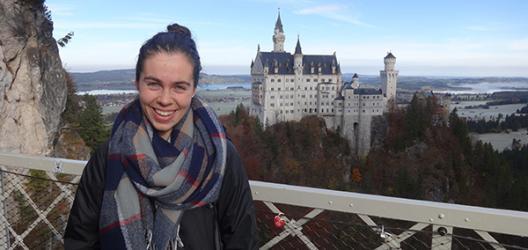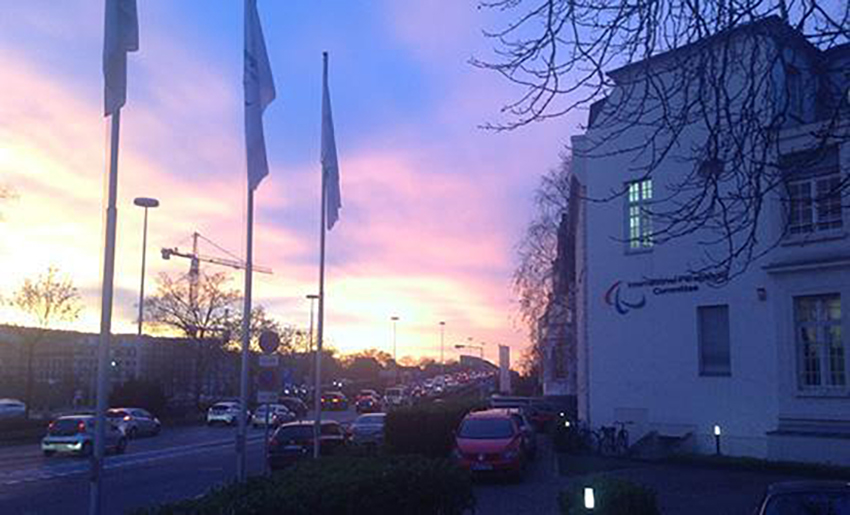
This article was written in Fall 2016 during Liz's Co-op work term with the International Paralympic Committee.
It is a Saturday afternoon and I am sitting at my desk in my home just outside of the German city of Bonn. I have just finished a busy, but exciting week at work in which I finished creating some content for the International Paralympic Committee (IPC)’s social media channels and a busy, but exciting month in which I have travelled to Berlin, Munich, Paris, and Poland. My new glühwein mug from Bonn’s Christmas market and all of the other typical European items I have collected over the past two months are spread out in front of me. Even though I’ve been here for a while, it is moments like these where I have to stop and remind myself that this is not a dream—I am actually living in a foreign country and working at an incredible international sports organization and not just surviving, but thriving.
I am currently nearing the end of a three month internship in the International Paralympic Committee (IPC)’s Media and Communications department in Bonn, Germany. As I am pursuing a career in sports communications, this internship has essentially been (pardon the cliché) a dream come true. It has been amazing to be able to work in an area that I am passionate about with an organization that is driven to change the world through Para sport. While my home city and its surrounding area (Vancouver and the Lower Mainland) is a sports and media hub with lots of opportunities, choosing to do a work term abroad with an international organization has given me experiences that I would likely not have gained had I stayed close to home.
At the IPC, I have helped create and post content to 12 winter sport social media accounts (on Facebook, Twitter, and Instagram). This has involved developing a detailed social media content schedule and brainstorming unique ideas for posts (such as ‘Meet the Team’ videos for the World Para Ice Hockey accounts and #FavouritesFriday graphics for the World Para Nordic Skiing accounts). I have designed graphics, edited videos, organized athlete social media takeovers, and shared content from athletes’ channels, amongst other things.

Very quickly one of my favourite things about working with an international organization like the IPC became the cultural diversity of the staff and of the people the organization serves. I have always had a hunger for travelling and experiencing other cultures, and this hunger was fully satisfied while at the IPC. For example, in the 10 person Media and Communications office alone, seven countries are represented. I have loved constantly learning about different customs, food, laws, and ways of life from the people around me. My day-to-day work as a social media intern is saturated with cultural diversity, as the IPC serves athletes from around the world and is the governing body of the Paralympic Games and the International Federation for nine Para sports.
This incredible diversity has meant that I am (and have to be) in a constant state of learning. It has also meant being aware of and respectful towards cultural differences and the ways in which these differences impact the work I do. This constant state of learning and openness to new and different cultures is, in my opinion, crucial to networking and building international relationships. This constant state of learning is also a characteristic that is crucial to working in the world of media and communications, as social media and technology are constantly changing. It can be easy when you relocate to a new country to miss your home culture and stay guarded in an attempt to cope with being away from home—but being constantly open to learning new things and actively getting involved in your new country’s culture is what makes working and living abroad so worthwhile and enjoyable. It also provides opportunities for you to examine your own culture; I have reflected a lot on Canadian work environments and communications tactics as well as Canadian values, political regulations, and customs.
It is possible to find great work experiences close to home (I’ve had some fantastic co-ops in Vancouver), but I would greatly encourage everyone to look beyond their home borders and see what is available in other countries. Working and living abroad can be scary—there have definitely been times when I have questioned whether or not I’m skilled enough to work at such a large and prominent organization and brave enough to live abroad. But the benefits outweigh the costs. It is impossible to work and live abroad and not learn something new, whether that be about your industry, about other cultures, or about yourself. Working abroad you will make incredible connections, gain transferrable workplace skills, and develop an understanding of life outside of your home culture and a curiosity to know more. So go and explore the world—and remember to keep your mind open and keep learning!















